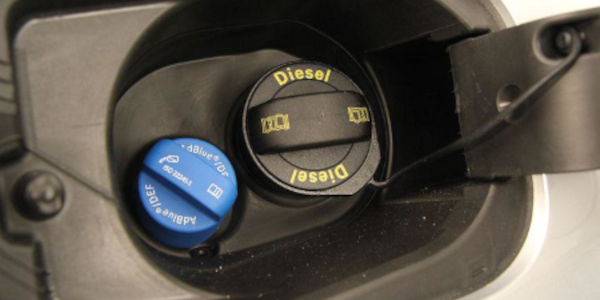AdBlue is a type of solution that is used in modern diesel engines, with the primary purpose of reducing harmful emissions. As AdBlue is becoming more popular, you might have some questions surrounding it. In this blog from APD, we’ll take a look at what AdBlue is, how it works, and why your vehicle needs it!
What is AdBlue?
AdBlue is a solution made up of urea and water injected into some diesel car, van or HGV’s exhaust system before harmful nitrogen oxide comes out of the tail pipe, meaning that the harmful emissions that they usually create is significantly reduced. AdBlue is an exhaust fluid, not a fuel additive. It’s stored in a separate reservoir and is usually topped up via a blue filler cap located either next to your fuel filler, in the boot or under the bonnet. It is also not actually blue at all but a colourless liquid!
How does AdBlue work?
Tiny amounts of AdBlue are injected into the flow of exhaust gases. At high temperatures AdBlue turns to ammonia and carbon dioxide. Inside the exhaust system harmful nitrogen oxide in the exhaust reacts with the ammonia and is transformed to harmless nitrogen and water. Although AdBlue doesn’t completely eradicate your vehicle’s nitrogen oxide emissions, it does significantly reduce them!
Why Do Cars Need AdBlue?
If you are driving a modern diesel car or van, then it is likely that you will need to use AdBlue. As we have mentioned, AdBlue helps to reduce emissions of nitrogen oxide from the exhaust of a car. This type of solution is becoming more important for diesel vehicles because of the Euro 6 Emissions Standard, which places restrictions on the amount of nitrogen oxide that can be released into the atmosphere.
How to Tell if AdBlue Levels are Low
When your AdBlue is close to empty, a bit like with your fuel a light should come up on your dashboard or a message appear asking you to top up our AdBlue fluid. Unlike fuel, the vehicle only uses small amounts of AdBlue on each journey so you will not need to top up as frequently as you visit a fuel station but like fuel, if you run out of AdBlue you vehicle will not start until you top it back up. With this in mind we recommend that you re-fill the AdBlue as soon as the warning appears to save you hassle in the future. Once you’ve filled up the AdBlue tank, the warning light should disappear.
Unsure about warning lights and how they can help you identify issues with your vehicle? Take a look at our blog ‘Understanding Your Car Warning Lights’.
What Happens if You Run Out of AdBlue?
If your vehicle runs out of AdBlue, it will likely enter a restricted operating mode, reducing engine performance to minimise emissions. Some vehicles may even prevent the engine from starting until AdBlue is refilled. As a result, it’s integral that you keep an eye on your AdBlue levels and refill at the earliest opportunity.
How Do I Know When AdBlue Tank is Full?
Most vehicles with AdBlue systems have sensors and warning lights that indicate the level of AdBlue in the tank. When you add AdBlue, the warning light or message on your dashboard will disappear once the tank is sufficiently filled. Some vehicles may also have a gauge showing the exact level of AdBlue. If you’re wondering ‘can you overfill AdBlue tank?’, the answer is yes. Overfilling the tank can cause spills and potential damage to the vehicle’s SCR system. Always fill the tank slowly and carefully, stopping once it reaches the recommended level.
Is AdBlue Harmful to the Environment?
AdBlue is a solution that causes no damage to the environment. If you end up in a situation where you spill AdBlue, it’s not toxic or flammable so you can easily wipe or mop it up. However, we would advise against touching the solution directly because it can irritate your skin.
How Long Does AdBlue Last?
Due to its nature AD blue has a limited shelf life of around 1 Year before it starts to degrade. It is best kept between -11 and 20 degrees C. If is is stored below -11 then it may freeze but should be fine when it thaws again. If, however it is stored above 30 degrees C the mixture will start to decompose.
APD Car Parts, Trusted AdBlue Suppliers
At APD Car Parts, we stock a range of AdBlue products from brands such as Carlube Tetrosyl and Febi Bilstein. We know how important it is to receive car products that are of high-quality, which is why we’re dedicated to supplying our customers with products from reputable and established brands. With free delivery over £30, shop our wide selection of automotive ADBlue products here!

